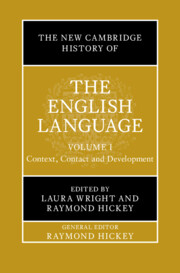Book contents
- The New Cambridge History of the English Language
- The New Cambridge History of the English Language
- The New Cambridge History of the English Language
- Copyright page
- Contents
- Figures
- Tables
- Maps
- Contributors to Volume I
- General Preface
- Abbreviations
- General Editor’s Introduction
- Introduction to Volume I
- Part I The Context of English
- Part II Contact and External Influences
- Part III The Long View by Levels and Areas
- 14 Historical Phonology
- 15 Historical Morphology
- 16 Historical Syntax
- 17 Historical Semantics
- 18 Historical Pragmatics
- 19 Historical Sociolinguistics
- 20 Historical Onomastics
- Appendix: Recommended Reading
- Index
- References
18 - Historical Pragmatics
from Part III - The Long View by Levels and Areas
Published online by Cambridge University Press: 30 October 2025
- The New Cambridge History of the English Language
- The New Cambridge History of the English Language
- The New Cambridge History of the English Language
- Copyright page
- Contents
- Figures
- Tables
- Maps
- Contributors to Volume I
- General Preface
- Abbreviations
- General Editor’s Introduction
- Introduction to Volume I
- Part I The Context of English
- Part II Contact and External Influences
- Part III The Long View by Levels and Areas
- 14 Historical Phonology
- 15 Historical Morphology
- 16 Historical Syntax
- 17 Historical Semantics
- 18 Historical Pragmatics
- 19 Historical Sociolinguistics
- 20 Historical Onomastics
- Appendix: Recommended Reading
- Index
- References
Summary
Historical pragmatics studies the use of language in earlier periods and the developments of usage patterns over time. Recent research in this area has increased our understanding of how usage patterns develop, and we have gained insights into a range of pragmatic phenomena at specific times in the history of English. This chapter provides exploratory accounts for each of the traditional periods in the history of English, from Old English up to Present-day English by focusing on those areas within historical pragmatics that have already received sufficient scholarly attention, in particular the use of pragmatic markers, speech acts and the use of politeness. These overview sketches of the individual periods will be linked through an analysis of specific development patterns.
Keywords
Information
- Type
- Chapter
- Information
- The New Cambridge History of the English LanguageContext, Contact and Development, pp. 666 - 719Publisher: Cambridge University PressPrint publication year: 2025
References
Accessibility standard: WCAG 2.0 A
Why this information is here
This section outlines the accessibility features of this content - including support for screen readers, full keyboard navigation and high-contrast display options. This may not be relevant for you.Accessibility Information
Content Navigation
Allows you to navigate directly to chapters, sections, or non‐text items through a linked table of contents, reducing the need for extensive scrolling.
Provides an interactive index, letting you go straight to where a term or subject appears in the text without manual searching.
Reading Order & Textual Equivalents
You will encounter all content (including footnotes, captions, etc.) in a clear, sequential flow, making it easier to follow with assistive tools like screen readers.
You get concise descriptions (for images, charts, or media clips), ensuring you do not miss crucial information when visual or audio elements are not accessible.
Visual Accessibility
You will still understand key ideas or prompts without relying solely on colour, which is especially helpful if you have colour vision deficiencies.
Structural and Technical Features
You gain clarity from ARIA (Accessible Rich Internet Applications) roles and attributes, as they help assistive technologies interpret how each part of the content functions.
